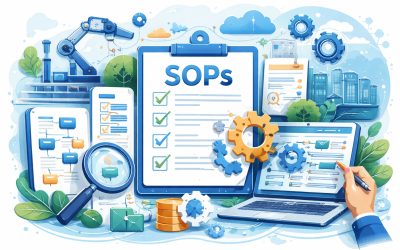Recognizing the Critical Signs of ERP Implementation Readiness in Your Manufacturing Business
Manufacturing organizations often reach a critical juncture where operational inefficiencies compound into systemic barriers to growth. When inventory discrepancies become routine, data exists in isolated spreadsheets, and decision-makers lack confidence in reported figures, these symptoms indicate potential ERP implementation readiness. Understanding whether your organization has reached this pivotal moment requires careful assessment of both operational challenges and organizational preparedness for transformational change.
The Financial Impact of Disconnected Business Systems
Fragmented systems create measurable operational inefficiencies that directly impact profitability and competitive positioning. Organizations operating without integrated enterprise resource planning capabilities typically experience significant time loss as personnel dedicate approximately 30% of their working hours to data reconciliation and information retrieval rather than strategic decision-making.
Inventory management suffers considerably without unified systems. Manufacturing businesses commonly experience simultaneous overstock situations in certain material categories while facing critical shortages in others. Customer fulfillment timelines extend as teams struggle to determine accurate stock availability, resulting in delayed shipments and diminished customer satisfaction.
Perhaps most concerning is the competitive disadvantage that emerges. While competitors leverage integrated data systems for rapid market response and strategic agility, organizations with disconnected systems remain occupied analyzing historical performance rather than anticipating future opportunities.
Essential Indicators That Signal ERP Implementation Readiness
Proliferation of Manual Data Entry and Redundant Processes
A primary indicator of ERP implementation readiness is the prevalence of manual, redundant data entry across multiple systems. When personnel must input identical information into separate platforms, or when obtaining basic inventory counts requires consulting multiple disconnected sources, the organization has exceeded the capacity of its current infrastructure. These manual processes not only consume valuable time but also introduce significant opportunities for data inconsistencies and operational errors.
Business Growth Exceeding System Capabilities
Organizational growth represents a positive development, yet it simultaneously reveals infrastructure limitations. When expanding operations results in declined orders due to complexity management challenges, or when employee onboarding extends over several months due to convoluted process documentation, growth itself becomes constrained by inadequate systems. This scenario represents a clear signal of ERP implementation readiness—success is being actively limited by technological infrastructure rather than market opportunity or organizational capability.
Organizational Commitment and Resource Allocation
ERP implementation success depends more heavily on organizational factors than technical considerations. True ERP implementation readiness requires executive leadership that recognizes this initiative as a comprehensive business transformation rather than merely an IT project. Leadership must demonstrate willingness to allocate appropriate time, financial resources, and organizational energy toward fundamental operational changes. Without this commitment level, even technically sound implementations frequently fail to deliver anticipated value.
Data Integrity Challenges Affecting Strategic Decision-Making
The inability to make confident strategic decisions based on trusted data represents a critical indicator of system inadequacy. When leadership hesitates to rely on reported figures for significant business decisions, or when data validation consumes excessive time before analysis can begin, these circumstances indicate both the need for integrated systems and sufficient ERP implementation readiness to justify the investment.
Understanding True ERP Implementation Readiness Beyond Surface Symptoms
Genuine ERP implementation readiness extends beyond merely identifying operational problems. It encompasses organizational preparedness to address these challenges through comprehensive, sustainable solutions.
Organizations demonstrating authentic readiness maintain realistic timeline expectations, acknowledging that successful implementations require more time than initially anticipated. These organizations understand that software acquisition represents only one component of the solution—the substantive work involves business process redesign and comprehensive personnel training.
Most critically, ready organizations recognize that ERP implementation constitutes business transformation rather than technology replacement. This perspective shift proves essential for achieving meaningful operational improvements and maximizing return on investment.
Strategic Steps Toward Successful ERP System Deployment
Organizations recognizing these readiness indicators should pursue deliberate, strategic action rather than reactive implementation. However, thorough preparation remains essential to successful outcomes.
Begin with comprehensive assessment of current operational state. Document existing processes in detail, identify the most significant operational pain points, and establish clear success criteria specific to your organizational context. This foundational understanding enables informed decision-making throughout the implementation journey.
Successful manufacturers approach ERP implementation as a catalyst for organizational evolution. Rather than simply installing new software, they leverage the implementation process to fundamentally transform operations, positioning the organization for sustained success over the coming decade.
Evaluating Your Organization’s ERP Implementation Readiness
Determining whether your manufacturing business demonstrates genuine ERP implementation readiness requires expert assessment and strategic planning. TSVMap specializes in guiding manufacturers through these complex evaluations, beginning with comprehensive assessments that provide clear understanding of current operational status and optimal next steps.
Our experienced team helps manufacturing organizations navigate the critical decision-making process surrounding ERP system selection and implementation. We focus on ensuring that your investment in enterprise resource planning technology delivers measurable operational improvements and positions your business for long-term competitive advantage.
Contact TSVMap today to schedule a consultation that will provide clarity regarding your organization’s ERP implementation readiness and establish a strategic roadmap for successful digital transformation.
![]() TSVMap is committed to enhancing your manufacturing processes and providing expert consultation on your IT solutions, striving to maximize their effectiveness and efficiency. If you require assistance with…IT Solutions, Assessment, Consultants, ERP Systems, MRP Systems, Automations, or Cyber Security. Contact us today at 864-991-5656 or Email info@tsvmap.com.
TSVMap is committed to enhancing your manufacturing processes and providing expert consultation on your IT solutions, striving to maximize their effectiveness and efficiency. If you require assistance with…IT Solutions, Assessment, Consultants, ERP Systems, MRP Systems, Automations, or Cyber Security. Contact us today at 864-991-5656 or Email info@tsvmap.com.









0 Comments